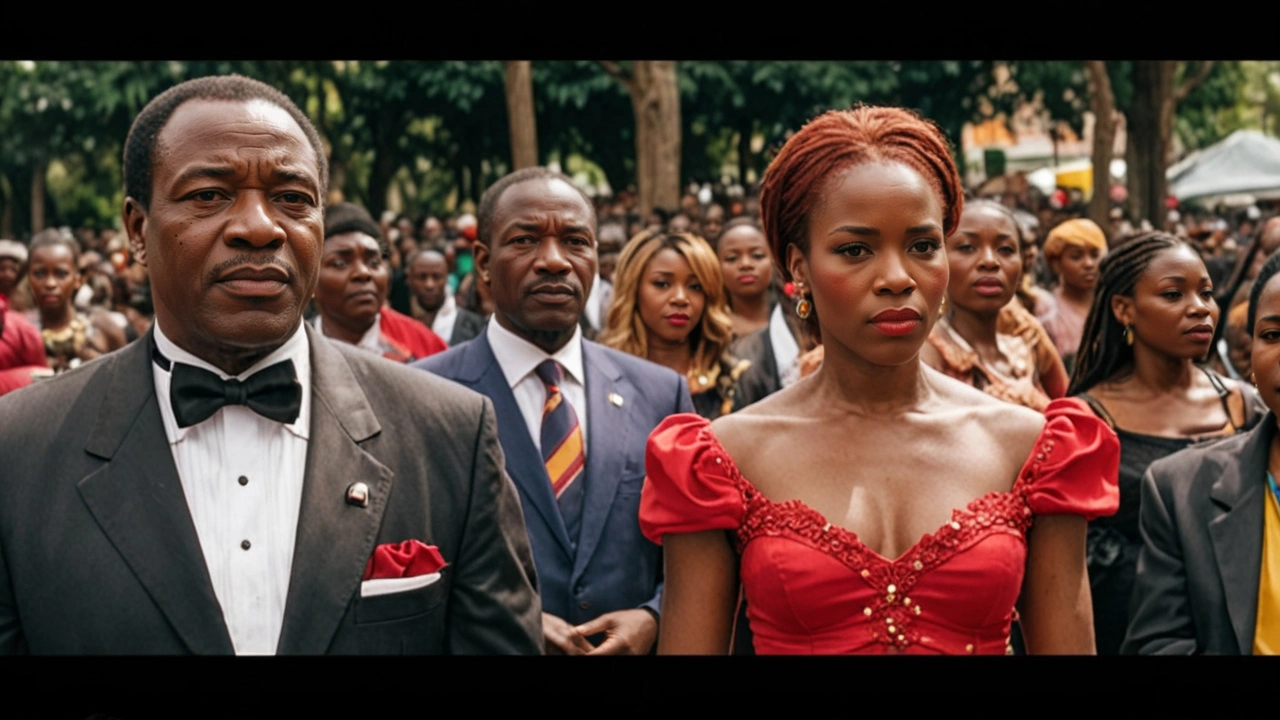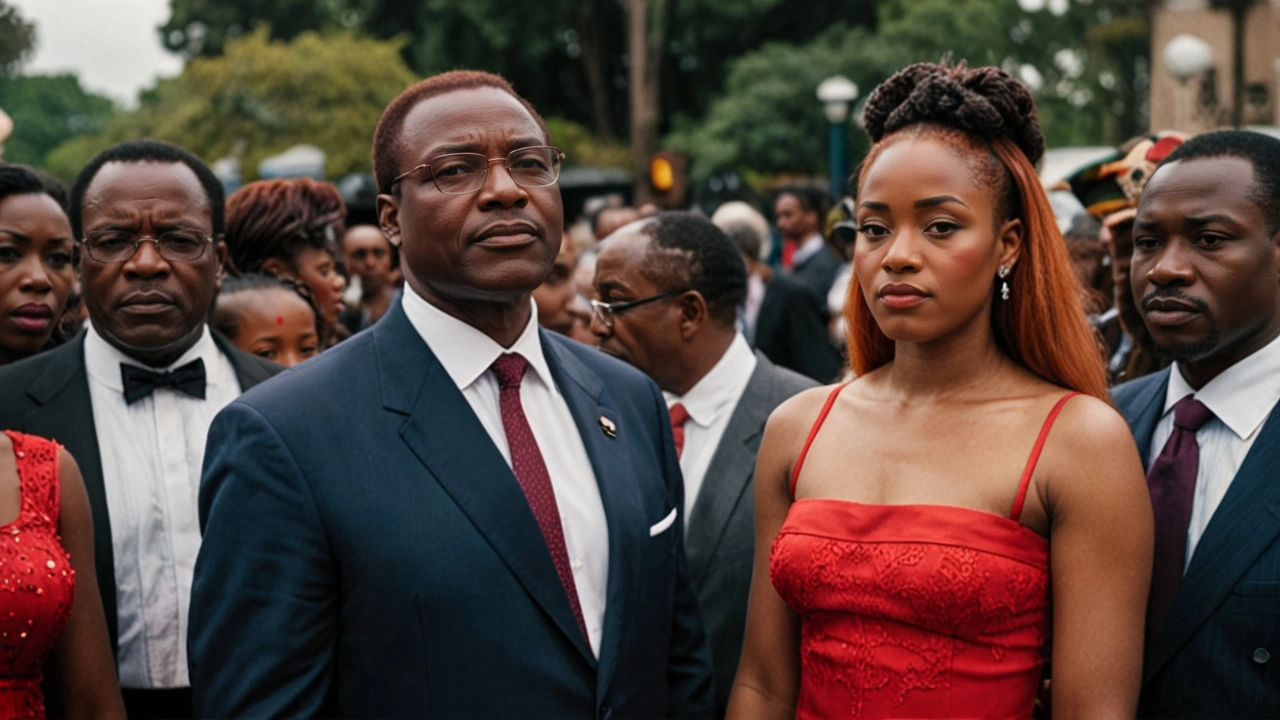Brenda Biya's Courageous Declaration Sparks Intensified Debate on LGBTQ Rights in Cameroon
Brenda Biya, the 26-year-old daughter of Cameroon’s President Paul Biya, has ignited a passionate conversation about LGBTQ rights in her country following her public declaration that she is a lesbian. By sharing images of herself with her girlfriend on social media, Brenda has not only reshaped public discourse but also brought to the forefront the brutal realities faced by LGBTQ individuals in Cameroon.
Public and Political Reactions
Brenda’s announcement was met with both admiration and hostility. While many congratulatory messages poured in, commendations for her bravery were interspersed with sharply critical and derogatory comments. LGBTQ activists in Cameroon seized this moment to advocate for greater recognition and protections for their community. Brenda’s openness is viewed by some as a pivotal step towards increased visibility and, potentially, acceptance of LGBTQ individuals in a country where same-sex relationships remain a criminal offense.
Cameroon’s societal and legal landscapes present significant challenges to LGBTQ activism. The nation's laws explicitly prohibit same-sex relations, carrying penalties of up to five years in prison. Despite these rigid legal constraints, activists like Bandy Kiki argue that Brenda Biya’s revelation could serve as a catalyst for pressing conversations and legal reforms. Bandy Kiki has been vocal about dismantling religious and societal barriers, asserting that outdated Biblical laws should not dictate contemporary human rights standards.
Religious Stances and Ethical Debates
The response from religious entities has been starkly contrasting. Reverend Father Humphrey Tatah Mbui, a prominent figure within the Roman Catholic establishment, condemned Brenda Biya’s declaration, labeling homosexuality as a moral deviation. The church’s stance against LGBTQ persons remains forceful, complicating prospects for change within deeply religious communities.
On the other side, LGBTQ advocates are challenging such rigid interpretations. They highlight the need for modernizing views that align with human dignity and personal autonomy. The divergence between progressive activists and conservative religious leaders underscores a cultural and ethical rift that both parties are grappling to navigate.
Legal Complications and Human Rights Concerns
Brenda Biya’s revelation also plunged her into the center of legal controversy. A complaint has been filed against her for endorsing what is considered, under Cameroonian law, an illegal activity. This complaint is currently under review by the Ministry of Justice officials. For many activists, this legal action highlights the systemic and ongoing persecution of LGBTQ individuals in Cameroon.
Human rights organizations report that approximately 16 individuals are currently imprisoned for alleged consensual same-sex activities or for defying gender norms. These figures are a grim reminder of the harsh penalties and societal stigma that LGBTQ persons endure. The international community has also taken note, with global human rights groups urging Cameroon to decriminalize same-sex relations and protect the rights of all its citizens, regardless of sexual orientation.

The Potential for Change
Despite the bleak legal landscape, there is a simmering hope among activists and allies that Brenda’s public stand could facilitate change. Her position as the President’s daughter brings a unique spotlight to the LGBTQ struggle in Cameroon. Many believe that her courage to speak out could inspire others in similar positions of influence to advocate for tolerance and equality.
While President Paul Biya has not publicly commented on his daughter’s declaration, his silence speaks to the complexities surrounding this issue at the highest levels of government. The coming months may prove to be critical, as public opinion continues to evolve and more individuals potentially step forward, adding their voices to the call for respect and legal reform.
Looking Forward
As Brenda Biya’s story unfolds, it is emblematic of the broader struggle for LGBTQ rights in environments steeped in traditional and religious practices. The young woman's bravery winds through every conversation, every piece of legislation discussed, and every action taken by activists and opponents alike. Whether this moment will translate into substantive change remains uncertain, but it is undeniably a significant step in the ongoing battle for recognition and respect for the LGBTQ community in Cameroon.


Comments (10)
Brenda’s courage shines a light on the need for real dialogue in Cameroon.
It’s remarkable how a single voice can disrupt long‑standing silence. Brenda’s openness forces both the public and policymakers to confront the realities faced by LGBTQ Cameroonians. While some may react with hostility, the broader conversation is a step toward empathy and eventual reform. Activists should harness this momentum to press for de‑criminalisation and protect basic human rights. The international community can also lend support by spotlighting these injustices.
i cant help but think about the deeper toughts behind such a brave act. it feels like a whisper in a storm, yet it reverberates across the entire nation. when someone defiantly lives their truth, it challenges the very foundations of what we accept as normal. maybe the world will finally see that love isn’t a crime, even if some still call it definatly wrong. it’s a reminder that humanity’s progress often begins with a single, bold confession.
Sure, let’s all cheer a privileged daughter while the rest of the community stays locked up. It’s a classic stunt to give the illusion of change without touching the real suffering. The media will paint it as a victory, but the legal system stays untouched. If you think this public display will melt decades of oppression, you’re living in a fantasy.
Brenda’s story is a beacon of hope! 🌈 It shows that even in the toughest environments, authenticity can thrive. Let’s keep amplifying these voices and push for concrete legal reforms. Change starts with visibility and solidarity. 🙌
What we’re seeing is not just a personal revelation; it’s a calculated move by elite forces to distract us from the systematic erasure of LGBTQ lives. Behind every bold declaration lies a hidden agenda, a puppet master pulling strings to give the illusion of progress while the prisons stay packed. The cabal of politicians loves to showcase a single “progressive” story while tightening the noose on countless others. This is the classic “look‑at‑me” trick, a smoke‑and‑mirrors ploy designed to keep the masses complacent. Don’t be fooled by the glittering façade; the real battle is still being fought in the shadows, where ordinary people continue to suffer under draconian laws.
Brenda’s declaration undeniably marks a pivotal moment in the ongoing struggle for LGBTQ rights in Cameroon, and its reverberations extend far beyond the personal realm. By stepping into the public eye, she challenges entrenched societal norms that have long relegated queer identities to the margins. This act of visibility forces a re‑examination of the legal framework that criminalises consensual same‑sex relationships, highlighting the stark disconnect between statutory law and contemporary human rights standards. Moreover, the international attention her story has garnered amplifies pressure on Cameroonian authorities to consider reforms, as global bodies increasingly scrutinise nations that uphold punitive measures against sexual minorities. The ripple effect can inspire other hidden individuals to come forward, fostering a sense of solidarity and collective empowerment within the community. It also offers a tangible example for activists to leverage in advocacy, using her platform as evidence that change is possible even within restrictive environments. While the President’s silence may suggest political caution, the very fact that the issue is being discussed at such a high level indicates a shift in the public discourse. Legal challenges, such as the recent complaint filed against Brenda, serve as a litmus test for the judiciary’s willingness to confront oppressive statutes. If courts begin to interpret the laws with a more progressive lens, it could set a precedent for future cases involving LGBTQ individuals. Additionally, the role of religious institutions in shaping public opinion cannot be ignored; progressive theological arguments may emerge in response to the heightened visibility, potentially softening hard‑line stances. It is also crucial to recognize the psychological impact on younger generations who see a figure of authority openly embracing her identity, which can foster a healthier self‑acceptance among LGBTQ youth. In the broader African context, Cameroon’s experience may influence neighboring countries grappling with similar issues, illustrating how one nation’s internal debate can have regional implications. Ultimately, while Brenda’s bravery does not guarantee immediate legislative change, it undeniably seeds the ground for ongoing dialogue, legal scrutiny, and societal transformation.
Well said thanks for that insight
Great points, keep the conversation going and stay supportive of those pushing for real change.
The developments surrounding Brenda Biya’s announcement underline the complex interplay between cultural traditions, legal frameworks, and human rights advocacy in Cameroon. Observers should note how this case may serve as a catalyst for broader discussions on decriminalisation and societal acceptance.